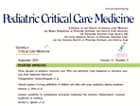Abstract and Introduction
Abstract
Objective: Severe head trauma and/or severe hypothermia (≤32°C) can cause cardiac arrhythmias. Effect of moderate hypothermia (32–33°C) on cardiac arrhythmias in children after severe traumatic brain injury is not well characterized. The objective is to determine the effect of moderate and short-term (24 hrs) hypothermia therapy on the incidence and severity of cardiac arrhythmias in children with severe traumatic brain injury compared with normothermic control subject using a 24-hr Holter recording.
Design: Prospective ancillary study of a multicenter randomized, controlled clinical trial.
Setting: A Canadian university-affiliated pediatric intensive care unit in a level III trauma center.
Patients: Patients <18 yrs with severe traumatic brain injury.
Interventions: Holter recording during moderate hypothermia (HYPO group; esophageal temperature 32–33°C) or normothermia (NORMO group; 36.5–37.5°C) induced for 24 hrs started within 8 hrs after a severe traumatic brain injury.
Measurements and Main Results: Sixteen patients who had a median age of 12.7 yrs (range, 7.2–17.0 yrs) were enrolled. The time from the injury to the start of the cooling process was 7.3 hrs (range, 6.6–7.8 hrs). The temperature when Holter recording began was 32.9°C (range, 31.6–34.4°C) in the HYPO group. Overall, 44% of all patients (seven of 16 patients) had arrhythmias (two of nine in the NORMO group and five of seven in the HYPO group, p = .13). The most frequent arrhythmias were isolated premature atrial contractions. Hypothermic patients had lower heart rates than normothermic patients (p = .01), but none had a severe bradycardia. In the NORMO group, one patient had accelerated junctional rhythm associated with hypotension. In the HYPO group, one patient had nonsustained monomorphic ventricular tachycardia.
Conclusions: Arrhythmias are frequent in severe pediatric traumatic brain injury. Further studies are needed to characterize the epidemiology and clinical impact of arrhythmias associated with severe pediatric head trauma and moderate hypothermia.
Introduction
Traumatic brain injury (TBI) is a leading cause of morbidity and mortality in the pediatric population.[1,2] Besides neurologic consequences, many nonneurologic complications are known to occur in critically ill patients with severe head trauma. Electrocardiographic changes, arrhythmias, and increased cardiac enzymes have been reported in patients with TBI, even without any traumatic cardiac injury,[3–7] and in patients with nontraumatic intracerebral hemorrhage. The frequency and the clinical impact of these cardiovascular complications are not well characterized.
Hypothermia therapy is under investigation as a treatment measure for severe TBI. Therapeutic hypothermia improves outcome of animals exposed to a severe brain injury.[8–10] Clinical trials on the use of moderate hypothermia therapy in the management of adults with severe TBI provided conflicting results.[11,12] Deep hypothermia can itself cause severe arrhythmias,[13] but the risk of arrhythmias attributable to moderate hypothermia in adults with TBI is not well characterized. Even less is known about these risks in children.
A large international multicentered, randomized clinical trial (RCT) was undertaken to study the efficacy of moderate- and short-term hypothermia therapy to improve the neurologic outcome in children with severe TBI.[14] We took advantage of this RCT to conduct an ancillary study and monitored prospectively the cardiac rhythm over a 24-hr period at one participating center (Sainte-Justine Hospital). The purpose of the ancillary study was to compare the incidence of arrhythmias in severe pediatric head trauma during moderate short-term hypothermia (32–33°C for 24 hrs) or during normothermia (36.5–37.5°C). Our hypothesis was that moderate hypothermia therapy would not increase the frequency and the severity of cardiac arrhythmias in children with severe TBI.
Pediatr Crit Care Med. 2010;11(3):439-441. © 2010 Lippincott Williams & Wilkins
Cite this: Cardiac Arrhythmias Associated with Severe Traumatic Brain Injury and Hypothermia Therapy* - Medscape - May 01, 2010.







Comments